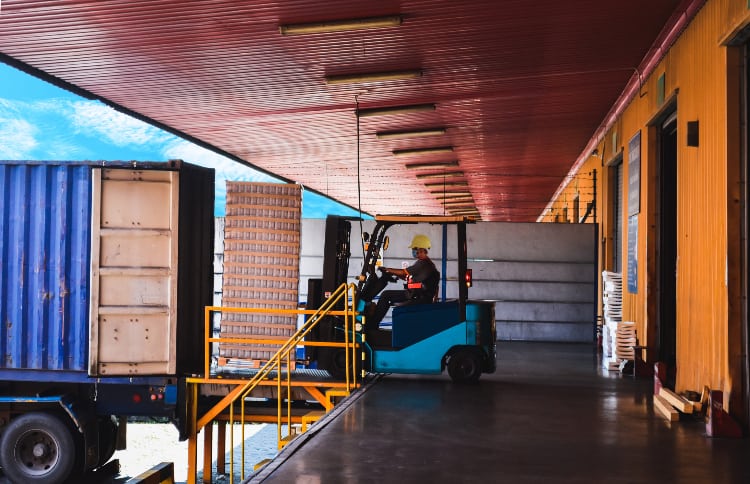Improperly Loaded Cargo? How They Cause Truck Crashes
August 27, 2021
Shifting & Unsecured Cargo Presents Real Risks & Big Dangers on the Roads
About 10,000 truck accidents a year are caused by moving and unsecured cargo, federal authorities report. That means about 1 in every 14 tractor-trailer wrecks involves a cargo issue. As surprising as that may be, it’s not the whole story.
In fact, the data also shows that, although they are rarer than other vehicle-related failures, cargo issues have the highest “relative risk” (56.3) of contributing to 18-wheeler crashes, when compared to any other risk factor causing wrecks.
That means that, while cargo issues may not be as common as other vehicle equipment problems, when there are problems with how cargo has been loaded and secured, there is an exceptionally high risk of a big rig wreck.
What Are the FMCSA Rules for Loading & Securing Cargo in 18-Wheelers?
To understand the dangers of cargo issues, it’s first critical to have a general understanding of the cargo loading and securement rules established by the Federal Motor Carrier Safety Administration (FMCSA).
In general, these rules state that:
Cargo must be firmly immobilized or secured on or within a vehicle by structures of adequate strength, dunnage (loose materials used to support and protect cargo) or dunnage bags (inflatable bags intended to fill space between articles of cargo or between cargo and the wall of the vehicle), shoring bars, tiedowns, or a combination of these.
In particular, the FMCSA cargo securement rules provide specific requirements for different types of cargo that may present unique challenges in transport or distinct dangers if not properly secured. Some types of cargo with unique FMCSA securement requirements include:
- Logs and dressed lumber
- Metal coils
- Paper rolls
- Concrete pipes
- Motor vehicles (including those that have been flattened or crushed)
- Heavy equipment and machinery
- Large boulders
In addition to these requirements, the FMCSA has also established cargo inspection requirements for truckers. These rules state that truckers must:
- Routinely inspect the cargo they are transporting while they are hauling it
- Make adjustments, as needed, to prevent shifting cargo.
What Are the Dangers of Unsecured & Shifting Cargo in Trucks?
Shifting and unsecured cargo in tractor-trailers is so dangerous because it can:
- Cause truckers to lose control of big rigs: Semis can weigh up to 80,000 pounds when fully loaded. If that cargo is moving around while the big rig is in motion, trucks can start to move into other lanes of traffic while becoming more difficult to maneuver and stop. If truckers are driving at higher speeds when this happens, there are far greater risks of wrecks.
- Alter the center of gravity for 18-wheelers: Suddenly moving cargo can redistribute the weight of a semi, putting the vehicle’s center of balance too high or too far forward. If that balance moves too much, shifting weight in a tractor-trailer can result in rollovers, jackknifes, and other devastating truck accidents.
- Cause cargo to spill out onto the roads: Even if shifting cargo does not derail or overturn an 18-wheeler, it could result in cargo falling off of a big rig and emptying onto the road. Depending on what that cargo is and how much traffic is around when that occurs, this has the potential to cause catastrophic, multi-vehicle accidents.
Who Is At Fault for 18-Wheeler Accidents Caused by Cargo Issues?
Liability for truck accidents involving cargo issues can be shared by various parties, depending on exactly how the crash occurred. In general, some questions that need to be answered in order to start determining fault for cargo-related truck accidents include:
- Who was responsible for loading the cargo before the trip?
- When and how frequently did a truck driver inspect the cargo once (s)he was on the road?
- Did any equipment failures, like faulty tiedowns, contribute to the cargo issues and the subsequent crash?
Discovering the answers to these and other key questions often requires deeper investigations and examinations of bills of lading, manifests, and data from electronic onboard recorders (EOBRs), among other evidence. Based on those answers, some of the parties that may be liable for cargo-related truck accidents can include:
- Loading dock workers if they have not properly loaded, balanced, or secured cargo
- Truck drivers if they failed to inspect and adjust cargo while hauling it
- Motor carriers if they fail to train staff on how to safely load and secure cargo or if their failure to maintain trucks results in an equipment failure that causes a cargo shifting or securement problem
- Equipment manufacturers if their faulty equipment, like defective trailer hitches, plays a role in cargo issues and 18-wheeler wrecks
An experienced truck accident lawyer can be the key to uncovering cargo loading and securement issues and proving that they were involved in a crash.
